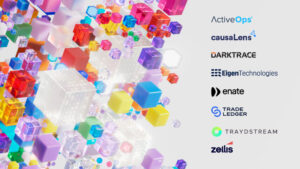
How digital tech can help manufacturers build resilience
Manufacturers that navigate and succeed in times of change all have one thing in common – they have resilience. Resiliency means not just operating and surviving now. It also means building better processes and operations for the future. As the sector looks towards economic recovery and competitiveness, this is clearly becoming important for manufacturers. To operate in a resilient, secure and sustainable way manufacturers need digital modernisation and a strong culture.
In a recent webinar, held by The Institute of Engineering and Technology, we spoke to other industry leaders about the recent shift of digital technologies from ‘nice to have’ to essential. We discussed the re-emergence of IT as a business enabler. Additionally, we talked about how manufacturers can use it to build resilience.
Digital technology as an enabler of resilience
 From what we’ve seen in our work in the sector, it’s not about implementing digital technology for the sake of it. It’s about ensuring the technology is aligned to business use cases and outcomes, both for today and for the future.
From what we’ve seen in our work in the sector, it’s not about implementing digital technology for the sake of it. It’s about ensuring the technology is aligned to business use cases and outcomes, both for today and for the future.
For manufacturers, data is an asset and they can leverage IoT or Industrial IoT, data analytics, AI and digital twins for resiliency. However, where the sector has been lacking is developing the right data strategy across the business, as well as standardising and sharing open data. Also, there needs to be more understanding of the business models that data and digital technology can enable.
The organisations who are successful in this take an agile approach to digital modernisation. They adapt quickly not just to the changing needs of the sector, but also to external circumstances and the expectations of an increasingly digital native workforce. To do this, we’ve seen many manufacturers approach digital modernisation through smaller projects instead of taking a wider waterfall approach. This can help build champions and leadership support, as they see the positive effects quicker.
Sustainable operations
Manufacturers need to continue to operate their assets as reliably and efficiently as possible. Additionally, as we head to a net zero future, manufacturers need to look at more sustainable ways to operate. This is where digital technology can help. Using a secure cloud platform, manufacturers can connect data across offices, factory floors, and more to create holistic views of their business.
Manufacturer Ricoh uses Azure Machine Learning and AI across all areas of its factory to manage costs, and access greater insights to optimise operations and reduce costs. Ricoh uses AI to adjust machines in real-time to respond to changing demand, and to predict maintenance. And by connecting this data to HR and financial systems, they can manage labour needs, track costs and more.
Create an agile supply chain
 Data helps embed visibility and intelligence into supply chains. A connected supply chain will predict disruptions, enhance visibility, improve planning, and maximise asset productivity. This, in turn will reduce waste and can deliver data that will help build a sustainable circular supply chain.
Data helps embed visibility and intelligence into supply chains. A connected supply chain will predict disruptions, enhance visibility, improve planning, and maximise asset productivity. This, in turn will reduce waste and can deliver data that will help build a sustainable circular supply chain.
Bel Fuse manufactures electronic circuits products globally. As part of a larger supply chain, they rely on small parts from suppliers before passing their components onto other manufacturers that create the finished products. Therefore, they need to ensure that they do not become a bottleneck in the process. By using Dynamics 365 Supply Chain Management, Bel Fuse now has a deeper, more precise view into its supply chain.
“Our system quickly shows us when parts haven’t arrived on time, and we can pivot to load our production with parts that are available,” says Stefan Naude, General Manager. “With Dynamics 365, we streamlined our planning and have flexibility to adapt to our vendors and adjust our inventory—all while remaining a reliable supplier.”
Personalise customer relationships
To be resilient you need to ensure you’re meeting your customers’ expectations in new ways. You need to engage with them throughout the relationship lifecycle. By connecting data silos, manufacturers can gain new insights into customer behaviours. They can also use AI and machine learning to predict, support, and improve customer relationships.
Malvern Panalytical designs, develops and commercialises analytical instruments for material analysis across a wide range of industries and applications. To help customers optimise their instruments, they built a digital solution that streamlines data capture – effectively offering them a ‘cloud-based control room’. Customers can use performance metrics to optimise assets. At the same time, Malvern Panalytical can use the data to understand how customers use their products. This allows them to offer better post-sales support and develop improved innovations.
Build the right culture for resilience
 Whether on the plant floor, the office, or mobile, your people need to be empowered to drive resiliency. Investing in your existing talent and attracting the right talent is important. Not only does this help your organisation to take advantage of digital tech, but it is also key to building innovation and new business value.
Whether on the plant floor, the office, or mobile, your people need to be empowered to drive resiliency. Investing in your existing talent and attracting the right talent is important. Not only does this help your organisation to take advantage of digital tech, but it is also key to building innovation and new business value.
Organisations need the right data and digital skills, plus a more agile culture to maximise impact. Manufacturers are clearly exploring these areas, but there is some way to go. Partnerships can support manufacturers here. At Microsoft, we have a range of learning resources available to help build technology competencies. The High Value Manufacturing Catapult is also working on data and digital skills programmes for the sector.
Use digital to innovate and build resilience
Finally, as manufacturers bounce back, using digital will be key to innovating and creating new business models and opportunities. For example, using technology to optimise and automate time-consuming manual tasks, giving employees more time to spend on value-adding work. At Phlexglobal, they use AI to automate the indexing and management of vaccine trial master files, improving time savings by 25-30 percent.
To be resilient, manufacturers also need to build partner ecosystems – not just within industry but across digital technology companies and other sectors. Open data and data sharing will help build resilience by driving new business models and innovations and creating more robust supply chains. We saw this in 2020, when British manufacturers united to build 20,000 ventilators in 12 weeks with the help of technology – something that would normally take 20 years.
For manufacturers, resiliency and digital modernisation go together. Embrace data and empower your workforce with the right skills to adopt an agile approach to implementation. Look for partnerships that support your goals and values to not only share expertise, but also innovate and drive new and current business models.
Find out more
The future of supply chains: Unlock sustainability through innovation
About the authors
 Rik leads Microsoft’s industry strategy across manufacturing, energy and resources in the UK. Responsibilities include working with the government and regulators, industry bodies, industry partners, and largest customers to ensure Microsoft enables sectoral needs. Rik sits on multiple industry boards for energy, manufacturing, research, digital twins and digital skills. His focus areas include the energy transition, sustainability, cyber security and digital technologies for operational environments.
Rik leads Microsoft’s industry strategy across manufacturing, energy and resources in the UK. Responsibilities include working with the government and regulators, industry bodies, industry partners, and largest customers to ensure Microsoft enables sectoral needs. Rik sits on multiple industry boards for energy, manufacturing, research, digital twins and digital skills. His focus areas include the energy transition, sustainability, cyber security and digital technologies for operational environments.
Prior to Microsoft, Rik worked at Cisco for 13 years, with global lead roles in energy and resource industries, IoT and security, and digital transformation. He has been a member of multiple industry standards groups and consortia, is a published author, has written multiple industry white papers, and has spoken at conferences all over the world. He has an MBA in international leadership and is currently studying sustainability and green economies.
 Lizzie works with a number of Manufacturing, Aerospace and Defence customers and partners in the UK, working closely with business leaders to help drive the use of digital technologies to achieve industry-focussed outcomes and unlock innovation. It is a pivotal time for both the Manufacturing and Aerospace industry to transform, with sustainability, factory of the future and connected supply chain being at the heart of many customer conversations, as well as the future of Manufacturing/work.
Lizzie works with a number of Manufacturing, Aerospace and Defence customers and partners in the UK, working closely with business leaders to help drive the use of digital technologies to achieve industry-focussed outcomes and unlock innovation. It is a pivotal time for both the Manufacturing and Aerospace industry to transform, with sustainability, factory of the future and connected supply chain being at the heart of many customer conversations, as well as the future of Manufacturing/work.




